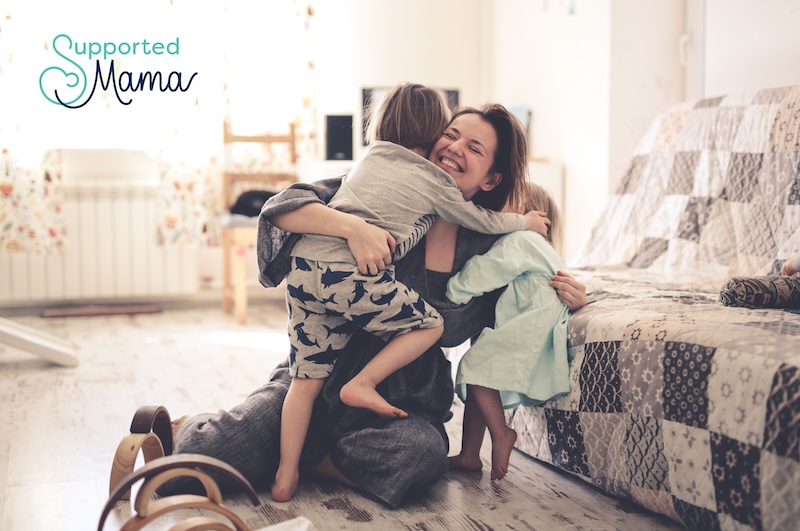Latest in Lifestyle Redesign®
May 2024
May is Mental Health Awareness Month
The Substance Abuse and Mental Health Services Administration (SAMHSA) recognizes May as Mental Health Awareness Month to increase awareness about how important mental health is to our overall health and well-being.
The first Wednesday of May is recognized as World Maternal Mental Health Day, which brings attention to the importance of addressing mothers’ mental health during pregnancy and postpartum “to enhance their resilience to difficult life circumstances and support them to nurture their children optimally.”
This month’s Latest in Lifestyle Redesign newsletter will highlight content focused on maternal health, including mental health, in honor of Mental Health Awareness Month, World Maternal Mental Health Day (5/1/2024), and Mother’s Day (5/12/2024).
LR IRL — Lifestyle Redesign in Real Life
An Empowered Momma

The transition from pregnancy to postpartum is often outwardly portrayed as a seamless stride into motherhood, despite the universal experience of physical changes and role disruption. For women like Kara, who have given birth to more than one child, there can be an added pressure the second (and third, etc.) time around to have it all figured out and silently endure.
Kara is a mother of two who experienced leakage, prolapse, and heaviness following both pregnancies. After her first child was born, these symptoms were normalized so Kara “pushed through”, however, three years later, after the birth of her second child, symptoms worsened and increasingly began to impact her daily life. By the time her second child turned two, Kara was still experiencing pelvic floor discomfort and a persistent sense of overwhelm; she reached the point where she could no longer remain silent. Through a local maternal health organization, Kara learned of Supported Mama, a private practice by Dr. Carlin Daley Reaume, OTD, OTR/L, DipACLM and decided to reach out for support.
During their initial evaluation together, it was clear to Carlin that Kara was carrying a lot of shame. The way in which she shared what she shared prompted Carlin to set the pelvic floor topic aside and start treatment by gently guiding Kara through reconnecting with herself. Carlin facilitated Kara through mindfulness activities (e.g., guided reflections and self-analysis) to bring awareness to Kara’s own needs and desires. This included building in brief “checkpoints” in Kara’s day to reflect on which occupations she was finding meaningful and, with that data, collaboratively working with Carlin to identify which activities she needed to spend more time in to optimize her mental health. Kara identified self-care as one of the most rejuvenating, easily accessible activities she could consistently engage in and began prioritizing this time with herself on a weekly basis.
Acknowledging Kara’s cognitive-emotional needs gave her the foundation to mindfully address her pelvic floor next. Despite years of self-led exercise-based approaches, Kara’s symptoms had not improved after the birth of her second child; Carlin explains that this can be common because “people don’t know what they are looking at, what they are trying to feel, or what is supposed to happen within their bodies as they move through their day”. For this reason, Carlin began with educating Kara on the basics of pelvic floor health and expanded to increasing Kara’s awareness of the connection between her symptoms and daily activities, such as lifting her little ones. From there, the sessions focused on guided pelvic floor work with mindfulness components (e.g., mirror-work and breathwork) to increase the connection between Kara’s mind and body. As Kara became familiar with how her body was moving, she could then reference these sensations when she was engaged in more functional movement, such as transitioning her little ones in and out of their car seats and stroller.
This growing embodiment empowered Kara to initiate hard conversations with her husband around their intimacy, which had been impacted by her symptoms, and most importantly, around how Kara had too much on her plate. The solutions that came from those discussions allowed for both Kara and her husband to feel supported and begin reworking their family’s routines. Kara’s mental load now had some lightness to it, which allowed her to give herself permission to engage in more restorative leisure activities.
The shame that Kara had once carried with her was no longer weighing her down; she now felt validated in her human experience. Kara’s symptoms had been gradually improving over the course of her time with Carlin (8 sessions over 18 months) and by the end of their time together, Kara expressed a sense of reassurance in knowing how to access the resources and supports she may need to continue healing.
When asked about her area of practice, Carlin shared:
“People often come to me with emotional heaviness and given the area of work that I am involved in, and especially with the pelvic floor, there’s a lot of vulnerability in navigating these topics. I really feel like a holistic approach, and OT, is such a good fit for this population because we can see the areas of life that get disrupted, or have a shift occur, during this time of transition. We as OTs are able to touch upon all these areas of life that other providers miss; we get to address the missing pieces of the puzzle.
It really is the ‘permission’ piece, the acknowledgement of the ripple effect of all of these parts of someone’s life, that we, as OTs, are really well-equipped to support people around.”
If this area of practice or Carlin’s experience is of interest to you, we highly encourage you to join her at the next webinar: Navigating Postpartum Wellbeing: How Occupational Therapy Can Meet The Need.
Research Spotlight
Exploring the Role of Occupational Therapy with Mothers Who Breastfeed

Occupational therapists (OTs) are uniquely positioned to support maternal wellness as mothers transition into their new role. Breastfeeding is a common occupation for mothers of newborns, yet many struggle to feel confident with integrating this new activity into their daily routines; this can make it challenging to then build a sense of connection with their new baby. As research has begun to shift towards mother-centered postpartum care, there is a role OT can play in supporting postpartum mothers in achieving their wellness goals and adjusting to their role as new mothers.
A mixed-methods design study led by Drs. Lauren Sponseller, Fern Silverman, and Pamela Roberts explored whether occupational therapy programming could assist mothers in achieving their personal wellness goals related to breastfeeding. The study involved participants attending 10 weeks of one-hour OT group sessions, tailored to the participants’ occupational profiles, goal attainment scale (GAS) scores, and input from lactation consultants.
Results from GAS score comparison indicated that the majority of participants reached their personal wellness goals, with an average post-intervention GAS score of 56.50 out of a maximum of 100. Thematic analysis of post-intervention interviews revealed that occupational therapy programming assisted mothers in persevering with breastfeeding, increasing their confidence as new parents, and fostering a greater appreciation for themselves and their babies. The study showcases OT’s value in maternal health and wellness and calls for further research supporting OT’s capacity to expand into this population.
*Must be an AOTA member to access full article
Scoping Review of the Role of Occupational Therapy in the Treatment of Women With Postpartum Depression

“The baby blues”, or postpartum depression (PPD), is more prevalent than many mothers may be aware of, though many who experience PPD endure in silence. Occupational therapists (OTs) have the skillset to support mothers experiencing PPD with their role transition by establishing a new sense of occupational balance.
A scoping review published in the Annals of International Occupational Therapy, explores existing literature to better understand the role OTs can have in addressing PPD among women. Findings illuminated three themes concerning the role of occupational therapy for women with PPD: (a) supporting occupational disruption and transitions, (b) managing the experience of motherhood in the context of depression, and (c) value added of occupational therapy to current PPD best practices. The review sheds light on the multifaceted nature of OT interventions that could be applicable to this population, including psychoeducation, lifestyle modifications, activity engagement, social support, and coping strategies. Moreover, the review highlights the significance of a client-centered approach, tailoring interventions to meet the unique needs and preferences of women experiencing PPD. OT has the potential to expand into postpartum care and contribute to developing an evidence base for PPD best practices.
Upcoming Opportunities
Navigating Postpartum Wellbeing: How Occupational Therapy Can Meet The Need
Webinar | Tuesday, June 18, 2024

Dr. Carlin Daley Reaume
In this 1- hour webinar, Dr. Carlin Daley Reaume will lead participants through an exploration of prevalent health and wellbeing challenges that can occur for people after giving birth and understand the critical role that occupational therapy can play in supporting clients through this significant time of transition. Attendees will gain a greater understanding of the impact of lifestyle considerations within this phase of life and learn simple, evidence-based intervention approaches that can create a powerful starting point for providing holistic care.
Date: Tuesday, June 18th, 2024
Time: 10am PDT
Location: Zoom
Cost: This webinar is offered at no cost. Registration is required to join the webinar.
CEUs: 1 contact hour (0.1 CEU)
About the Speaker: Carlin Daley Reaume, OTD, OTR/L, DipACLM
Certification Section
LRC Info Sessions
Join us for an information session this summer and learn more about Lifestyle Redesign Certification!
- Wednesday, June 12, 2024 @ 8am PDT
- Wednesday, July 17, 2024 @ 4pm PDT
Info sessions will be live, online events, hosted via Zoom:
- Topic: Lifestyle Redesign® Certification Information Sessions
- usc.zoom.us/j/94343068918
- Meeting ID: 943 4306 8918
For full Zoom meeting details and future info session dates/times, check out our calendar by visiting the Upcoming Events page.
Course Series Corner
Core Course 1 Starts September 9th!
Registration for the first course in the Foundations of Lifestyle Redesign Course Series is now open! Core Course 1 is the pre-requisite to all subsequent Course Series courses and will be offered annually in the Fall.
This is an online, paced asynchronous course, meaning you can access it from anywhere in the world and can expect a structured format to help you keep up with the course. Other supports include:
- Optional synchronous discussion sessions to provide the opportunity for participants to ask questions, seek clarification regarding course concepts and terminology, analyze case studies, and engage in problem solving.
- Course instructors available to respond to questions via email throughout the duration of the course.
Course Start: Monday, September 9, 2024
Course End: Friday, October 25, 2024
Format: online, paced asynchronous
CEUs: 12 contact course (1.2 CEU)
Cost:
- Regular: $400
- AOTA Members: $360
- USC Chan Alumni: $360







